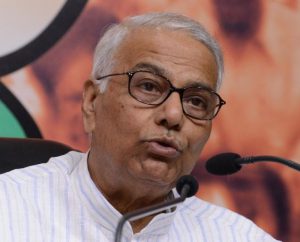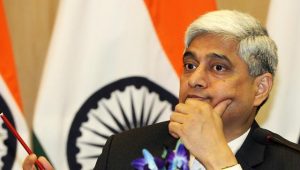New Delhi, September 25 (NIA): While the military response by India to the Pakistani militant attack on the Uri Indian army basis is being worked out, former Indian Foreign Minister and Bharatiya Janata Party (BJP) stalwart Yashwant Sinha wrote in The Indian Express that India should abrogate the Indus Waters Treaty with Pakistan with immediate effect.
India could legally do so because treaty terms are observed between friends, not enemies, and Pakistan is an enemy, he says. India will, therefore, be fully justified in abrogating the Indus Waters Treaty with Pakistan, he argues.
Critiquing this in Rediff.Com Online former diplomat M.K.Bhadrakumar says that surely India’s former External Affairs Minister, isn’t unaware why South Block never in the past pursued such a bright idea to ‘punish’ Pakistan.
Don’t Forget Indus Water Treaty Is America’s Baby

The BJP and the Sangh Parivar with their tunnel vision, may not know that although the Indus Waters Treaty is, strictly speaking, a bilateral covenant, it was negotiated behind the scenes by a third party — the United States — which even today takes pride that the covenant has survived the ravages of time in the subsequent tortuous 55-year history of our subcontinent, since it was signed in Karachi in 1960.
The sharing of waters between India and Pakistan was an idea that originally occurred to a brilliant American mind, David Eli Lilienthal, who once headed the Tennessee Valley Authority in the US (which was created by President Franklin Delano Roosevelt during the Great Depression for comprehensive development of the Tennessee Valley, especially for creating jobs through public investment).
Suffice it to say, the Indus Waters Treaty showcased the US’ commitment to assist the modernization of agrarian societies.
Lilienthal also had a strange weakness for our impoverished subcontinent whose acute problems of poverty somehow obsessed him. He later recounted in his journal: ‘India and Pakistan were on the verge of war over Kashmir. There seemed to be no possibility of negotiating this issue until tensions abated. One way to reduce hostility… would be to concentrate on other important issues where cooperation was possible. Progress in these areas would promote a sense of community between the two nations which might, in time, lead to a Kashmir settlement.‘
‘Accordingly, I proposed that India and Pakistan work out a program jointly to develop and jointly to operate the Indus Basin river system, upon which both nations were dependent for irrigation water.‘
‘With new dams and irrigation canals, the Indus and its tributaries could be made to yield the additional water each country needed for increased food production… I had suggested that the World Bank might use its good offices to bring the parties to agreement, and help in the financing of an Indus Development programme.‘
What a beautiful mind Lilienthal had! American pundits flag the 1960 Treaty as a golden moment vindicating that international mediation can actually work in resolving India-Pakistan issues.
To be sure, Modi cannot but be aware that he can find no better way of causing annoyance to ‘Friend Barack’ (who is, by the way, a staunch believer in America’s exceptionalism) than by erasing the finest moment in the chronicle of the untiring US mediatory efforts through several decades to navigate India-Pakistan relations away from the brink of war to cold peace.

Simply put, it is a no-go area for the Modi government, which is wedded to the bandwagon with the US in Asia. This is one thing.
Possible Impact
Second, do the ilk of Sinha realize what impact such an act on our part will create in the minds of the international community?
Do they really want Modi to be compared with Kim Jong-un, who, according to a newspaper with close ties to the Chinese Communist Party, once stripped naked his powerful uncle who fell out of favor, threw him into a cage to be eaten alive by a pack of ravenous dogs?
Make no mistake, depriving water deliberately to a nation of 190 million people is a repugnant idea. It sucks. The world community won’t forgive us.
Impact On India’s Neighbors
Besides, what would India’s small neighbors think? A maverick country arouses negative feelings.
How could Sri Lanka be sure that India would not abrogate the Kachchativu Agreement? How far can Bangladesh be complacent that the land boundary agreements with India are the last word?
Third, importantly, as the Bible says, ‘Do unto others as you would have them do unto you.’ If we do this to Pakistan, we also forfeit our claim to expect or demand from China similar prerogatives, as Pakistan has enjoyed under the Indus Waters Treaty.
Simply put, India will be creating a bad precedent. And, that will be exceedingly foolish, considering our very heavy dependence on waters flowing into our Hindi heartland from rivers that originate in Tibet.
Amid the diplomatic restraints with Pakistan following the Uri attacks, India insisted the continuity of the Indus Waters Treaty that was signed with Pakistan in 1960, relies on “mutual trust and cooperation” between India and Pakistan.
Indian Spokesman on New Delhi’s Stand

The 56-year-old Indus Waters Treaty today cropped up in the current hostile Indo-Pak discourse with India making it clear that “mutual trust and cooperation” was important for such a treaty to work.
The assertion came amid calls in India that government should scrap the water distribution pact to mount pressure on Pakistan in the aftermath of audacious Uri terror attack earlier this week.
Pressed further if India will scrap the treaty, he refused to elaborate and only noted that in diplomacy everything was not spelled out and that he has not said that the treaty was not working.
As per the treaty signed between the then Indian Prime Minister Jawaharlal Nehru and Pakistan President Ayub Khan in September 1960, water of six rivers – Beas, Ravi, Sutlej, Indus, Chenab and Jhelum – were to be shared between the two countries.
India controls Beas, Ravi and Sutlej, while Pakistan control Indus, Chenab and Jhelum.
Since the source of the rivers are in India, withholding the water from Pakistan can potentially create droughts and famines in Pakistan in case of a war.
In the press conference, Vikas Swarup said, “We do not need to produce a dossier since the whole world knows Pakistan’s role in sponsoring terror.”
On Thursday, the MEA had summoned the Pakistan envoy to India Abdul Basit to remind him of Pakistan’s commitment to strictly deal with the terrorism and to prevent terrorist acts from taking place in India’s soil.
The Bharatiya Janata Party (BJP) and the Indian National Congress (INC) have come out all guns blazing against Pakistan Prime Minister Nawaz Sharif’s address at the UNGA, questioning the neighbouring country’s “complete denial” of terrorism that stems from its soil.




























































